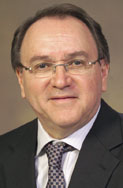Exploring ‘Funds of Knowledge’ at 2016 Families Learning Summit
Dr. Blaire Willson Toso, Goodling Institute for Research in Family Literacy at Penn State University, shares what Families Learning Summit attendees can expect from featured researcher Dr. Luis Moll.
 Dr. Luis Moll, a professor (emeritus) at the University of Arizona, has been working with parents, children, and teachers since 1978. He is well-known for his collaborative research with teachers to learn more about families’ strengths and how this knowledge can be used to inform practice and engage families in the classroom. Funds of knowledge refers to the fact that each person brings important knowledge to the table. His work has been important in helping us to intentionally recognize the learning and experiences that a person contributes; a vital concept when working with adults and children that are marginalized or stand outside of mainstream concepts of being literate. Because his work has been carried out in school settings it is particularly valuable to teachers and administrators as they initiate family engagement plans. In a recent conversation with Dr. Moll we talked about his groundbreaking work. Here are a few central points from the conversation.
Dr. Luis Moll, a professor (emeritus) at the University of Arizona, has been working with parents, children, and teachers since 1978. He is well-known for his collaborative research with teachers to learn more about families’ strengths and how this knowledge can be used to inform practice and engage families in the classroom. Funds of knowledge refers to the fact that each person brings important knowledge to the table. His work has been important in helping us to intentionally recognize the learning and experiences that a person contributes; a vital concept when working with adults and children that are marginalized or stand outside of mainstream concepts of being literate. Because his work has been carried out in school settings it is particularly valuable to teachers and administrators as they initiate family engagement plans. In a recent conversation with Dr. Moll we talked about his groundbreaking work. Here are a few central points from the conversation.
Teachers are vital to the research.
Teachers have been vital to Dr. Moll’s funds of knowledge research. His research has used families’ homes as a context for his research. Families have welcomed him and his research team into their homes, he says this is due to the teachers. When asked about this he responded, “Teachers are considered honored guests from the school.” He went on to point out another way in which they are essential to his work, “if there are no teachers, it limits the learning”—they are the ones who provide pedagogical insights and translate what they learn into classroom practice.
Initially, when Dr. Moll started doing research with teachers and families, the research was led by the researchers and teachers did not collect first-hand data on household life. However, after conducting the first study, the team realized that teachers were set apart from the families from whom they were supposed to learn. In the next study, teachers became co-researchers; they led the household interviews and observations and then participated in study groups to discuss what was learned. Through this process teachers began to focus on the families’ strengths and assets; they also began to think about what they were learning from the families and how it could inform their daily teaching and instructional activities. Two other outcomes that are also important to family literacy practitioners are that through this process teachers created bridges between families, schools, and classrooms and families became seen as an asset, as important resources for the classroom.
International Work with the Funds of Knowledge Concept.
Dr. Moll is currently editing a book on studies being undertaken outside the United States. Each of these studies continues to draw on funds of knowledge, wherein researchers seek to understand how the experiences and knowledge are used by families to live robust lives in difficult circumstances. These studies push the boundaries of what is determined as knowledge and concepts of family. One study he described to me (by Kendrick & Kakuru, 2012) explores how Ugandan youth, who become heads of household after losing their parents to AIDS, access resources and help keep their families intact.
Dr. Moll will be presenting an interactive session on Funds of Knowledge at the NCFL 2016 Summit on Tuesday, October 18, at 11:00am (Marquette B) The Translocation of Funds of Knowledge: Innovations in Theory, Methods, and Practices: This session provides an overview of the “funds of knowledge” approach to culture and education. Three aspects of this work are emphasized and a brief video of a household visit illustrates the dynamics of the approach. Attendees will learn how the approach has been elaborated, modified, or applied not only in the US but also in four different cultural settings— Spain, South Africa, Uganda, and New Zealand.
